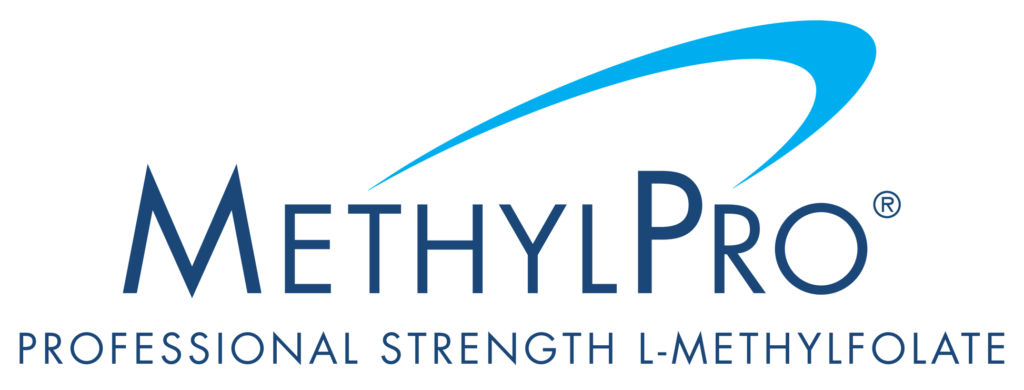Are you debating which supplement to purchase? L-Methylfolate vs folic acid? Or wondering why supplements containing l-methylfolate (vs folic acid) carry a much higher price tag? We’ve got the answers you’re looking for.
First, what is folate?
Vitamin B-9 is a water-soluble, essential nutrient which occurs naturally as “folate”. However, folate can be synthesized and is often added to food and nutritional supplements as “folic acid”. Folic acid, while highly-absorbable, is not active in the body. It must be converted to L-methylfolate in the body before it can be used.
Although vitamin B-9 is necessary for a number of crucial actions in the body (i.e. replication of DNA, making healthy red blood cells/protection from some types of anemia, and sufficient neurotransmitter production for mental health), low folate status is a common nutritional insufficiency. Insufficiency can be a result of not consuming enough folate-rich foods. It can also be caused by interfering health issues that prevent natural folate absorption, or a genetic inability to metabolize this vitamin properly.
What affects my folate levels?
Approximately half of the human population carry an inherited mutation in the MTHFR gene [1]. MTHFR is a gene that provides instructions to make an enzyme called methylenetetrahydrofolate reductase. This enzyme is a key factor in the breakdown of folate (or folic acid) to its active form, L-methylfolate (5-MTHF).
This reaction also converts the amino acid homocysteine to another amino acid, methionine. The body uses methionine to make proteins such as the neurotransmitters; dopamine, serotonin, melatonin, and epinephrine. The neurotransmitters are required for healthy sleep and a general sense of well-being.
Some people with MTHFR mutations live a normal life without experiencing symptoms. Others will experience a drop in enzyme efficiency by 30-70%, depending on the type of mutation they’ve inherited [2]. In these cases, folate doesn’t get converted to L-methylfolate and homocysteine is not efficiently broken down into methionine. Thus, production of our most important brain chemicals slows way down, dramatically affecting mood and energy levels.
But a low mood is not the only risk of an L-methylfolate deficiency. Unconverted folate and homocysteine levels build up in the blood without consistent conversion. Normal homocysteine levels are associated with a healthy cardiovascular system [3].
Only a genetic test by your doctor can confirm whether or not you have an MTHFR mutation. But, if you do, L-methylfolate supplementation could circumvent many of these metabolic complications.
What does “Fortified” mean?
Since research has shown that folate deficiency is such a common nutritional problem, and the risks are high, many foods have been “fortified” or have had synthetic folic acid added to their formulas. However, several studies have suggested that too much folic acid may have adverse effects if it builds up, unmetabolized in the bloodstream, especially in the elderly [4].
Folic acid is much slower to break down than natural folate, even in individuals with healthy folate metabolism, and requires the help of the liver and other tissues for activation [5]. This is a slightly different mechanism of action than that of food folate, which typically biotransforms directly after absorption by the gut.
On the other hand, L-methylfolate bypasses the entire folic acid metabolism cycle completely and is more effective than folic acid for increasing circulating active folate [5]. L-Methylfolate is also highly effective at reducing homocysteine levels (with or without an MTHFR mutation). It is more absorbable and interacts with fewer medications than folic acid [5]. Several studies have suggested that fortified food would provide greater benefits to a wider range of individuals if it contained L-methylfolate (vs folic acid) in the future [5].
What other health conditions?
There are a handful of diseases, unrelated to the MTHFR mutation, that can affect the absorption of folate by the gastrointestinal system. There are also a whole host of medications that can interfere as well, causing folate deficiency. A simple google search can help you determine if a condition you have, or medication you are taking, could be causing folate insufficiency.
How Can L-Methylfolate Help?
L-methylfolate can be taken as a dietary supplement to bring your circulating levels of active folate up to a level that can help properly clear homocysteine, supply the brain with precursors for neurotransmitters, and allow for healthy red blood cell production.
Dietary or nutritional supplements cannot make claims that they can be used to treat conditions or diseases, and so L-methylfolate is not considered to be a treatment.
Of course, you should always consult your physician before making a change to your health regimen, but your body can skip the folic acid cycle while getting all the benefits of vitamin B-9 with L-methylfolate. If you do have an MTHFR mutation, L-methylfolate may be what your body has literally been missing for a lift in your mood and energy levels.
References:
- https://www.ahajournals.org/doi/full/10.1161/CIRCULATIONAHA.114.013311
- https://www.futuremedicine.com/doi/abs/10.2217/epi-2019-0280
- https://bmcmedicine.biomedcentral.com/articles/10.1186/s12916-021-01977-8
- https://www.researchgate.net/profile/Yves-Menezo/publication/324697309_The_hazards_of_excessive_folic_acid_intake_in_MTHFR_gene_mutation_carriers_An_obstetric_and_gynecological_perspective/links/5ae0d143a6fdcc91399ec019/The-hazards-of-excessive-folic-acid-intake-in-MTHFR-gene-mutation-carriers-An-obstetric-and-gynecological-perspective.pdf
- https://www.sciencedirect.com/science/article/pii/S221475001930232X

